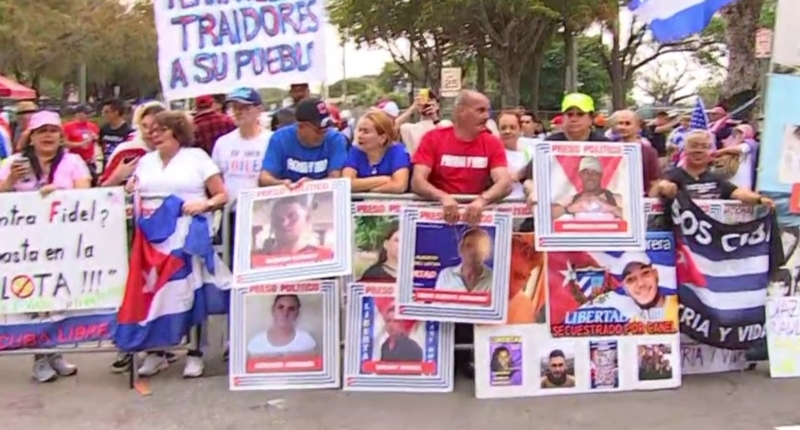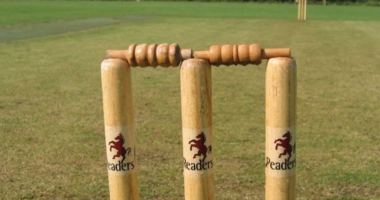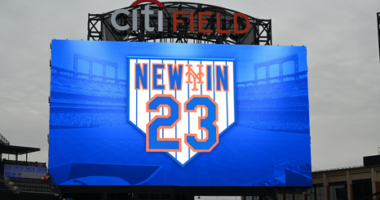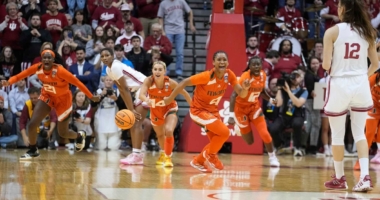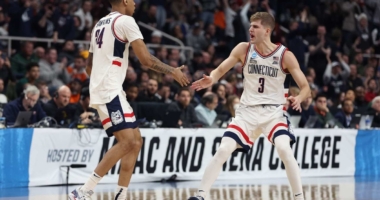Cuba’s baseball team has a rich history of success, but mass defections have limited its ability to remain competitive on the international stage. High-performing athletes in Cuba receive a salary from the government to train and compete, but professional sports have been prohibited on the island since the Cuban revolution 60 years ago. The United States has allowed Cuban-born Major League Baseball players to play for their homeland in the World Baseball Classic for the first time, creating a rare mixed roster of current Cuban players and defectors. This has sparked protests among some Cuban exiles, who argue that it disrespects the U.S. for allowing players who defected from a dictatorship to play for the same team that suppressed them. The game between Cuba and the United States in Miami’s Little Havana neighborhood has highlighted the intersection of sports and politics in international relations. It has brought attention to the popularity of baseball in Cuba and demonstrated the difficulties that come with reconciling national identities and political histories in sports.
Cuban Baseball Team Sparks Protests and Celebrations in Miami’s Little Havana
The semifinals of the World Baseball Classic have drawn both supporters and opponents of the Cuban national baseball team in Miami’s Little Havana neighborhood. The Cuban team’s first-ever game in Miami has prompted hundreds of Cuban exiles to gather outside the Miami Marlins’ home stadium, loanDepot Park, to protest against the team and the Cuban government.
For many Cuban exiles, the game is a cause for protest against the political oppression they escaped. Some of them were seen yelling outside the stadium, calling for anyone associated with the late Cuban leader Fidel Castro to leave the community. This includes Cuban players who are technically government employees.
On the other hand, some Cuban exiles are rooting for Team Cuba, like Yosvel Gonzalez, who was born in Cuba and now lives in the United States. He said he loves the U.S. because it gave him political asylum, but his land is still his land. For him, the environment during the game may be tense, but he supports the Cuban team.
There are also reminders of Cuba’s government throughout the community in Little Havana. For instance, Bull Bar, a popular bar during Miami Hurricanes football games, now displays a large poster on its wall that says “Freedom for Cuba” with a picture of a boot stomping on the island. Vendors were on street corners near the bar as early as 10 a.m. Sunday to sell apparel for both Team USA and Team Cuba.
Despite the conflicting sentiments, the game has drawn attention to the popularity of baseball in Cuba. While soccer is the most popular sport in Latin America, baseball dominates in Cuba. The game between Cuba and the United States in Miami’s Little Havana has sparked a heated debate about the Cuban government and its relationship with the Cuban people who now live in the United States.
Cuba’s Baseball Team and the Complexities of International Politics
Cuba has a rich history of success in baseball, winning Olympic gold medals in 1992, 1996, and 2004. However, the country’s ability to remain competitive on the international stage has been limited by mass defections of players. As a result, the Cuban baseball team failed to qualify for the 2020 Tokyo Olympics.
High-performing athletes in Cuba receive a salary from the government to train and compete, but professional sports have been prohibited on the island since the Cuban revolution 60 years ago. This has made it largely impossible for Cubans to play professionally for an American team without defecting. Furthermore, Cuba historically has not allowed Cuban players who defected to be on their national team rosters.
However, the United States has allowed Cuban-born Major League Baseball (MLB) players to play for their homeland in the World Baseball Classic (WBC) for the first time, creating a rare mixed roster of current Cuban players and defectors. While this has been a significant development in international baseball, it has also been controversial.
Some Cuban exiles have protested the mixed roster, arguing that it disrespects the U.S. for allowing players who defected from a dictatorship to play for the same team that suppressed them. Others, like Tampa Bay Rays outfielder Randy Arozarena, who was born and raised in Cuba, have chosen to represent other countries like Mexico instead.
Team Cuba’s captain, Alfredo Despaigne, has said that having fans cheering against the team won’t bother them. However, there are still complexities at play. Organizer of Sunday’s protests, Ramon Saul Sanchez, said that while he is not against the Cuban baseball players, the game has a lot of politics behind it.
The game between Cuba and the United States in Miami’s Little Havana neighborhood has highlighted the intersection of sports and politics in international relations. While it has brought attention to the popularity of baseball in Cuba, it has also demonstrated the difficulties that come with reconciling national identities and political histories in sports.
Don’t miss interesting posts on Famousbio

